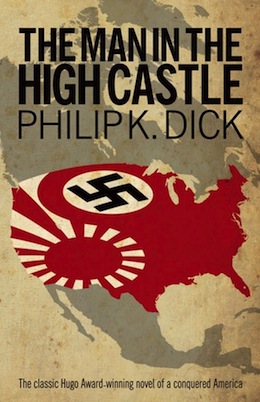One of my favorite books is Philip K. Dick’s The Man In The High Castle (an obvious influence on my own Osama), and one of the most important passages in that book comes very early on, on page 10 or so.
And then he thought about Africa, and the Nazi experiment there. And his blood stopped in his veins, hesitated, and at last went on.
It’s one of the most chilling lines in the book, and it’s important, I think, for what it doesn’t say. Dick does go on—“That huge empty ruin” and a little bit more—but we don’t, I don’t think we do, find out exactly what the Nazis did, what the “experiment” was. We get hints, throughout the book, throwaway references, but what Dick does here is to not mention, to allude without clarifying. Which is what makes it all the more horrific, of course. It is the thing We Do Not Like To Mention—something used, more recently, by Howard Jacobson in J, for instance, where it is the obscure “what happened, if it happened,” some sort of nameless Holocaust, too awful to ever mention.
I have often wondered about horror fiction. Lovecraft had it right about the need for “subtle suggestion—imperceptible hints,” yet so much of horror concerns itself with pulp tropes, werewolves, vampires, ghosts, that its very existence is comforting, that we are able to enjoy the sensation of fear by knowing this is not real, that it requires merely a momentary suspension of disbelief on our part.
John Clute defines much of horror fiction thus as “Affect Horror,” storytelling meant to “generate certain emotions.” I myself find striving for the effect of horror wearying as a writer, but it isn’t my natural milieu. One does not, it seems to me, get this kind of comfort from the passage above: for all that its setting is fictional, it is grounded in the real—in this case, of course, the Holocaust—and I find, increasingly, that my concern, as a writer, with the horror (the Horror) of the 20th and early 21st centuries owes nothing to Lovecraft and a lot to Hitler, nothing to King but a lot to Osama—and, perhaps, a lot to that short paragraph quoted above.
If I had to think of A Man Lies Dreaming, a novel as fantastical in conceit as anything else, with its unlikely noir vision of a gumshoe Hitler, it is as a comedy (for what is funnier than a Hitler without power?). And yet, what else but humor can underline the true darkness, the real horror? Dick’s novel is not a comedy; like all his work, it is the study of small lives caught in webs of deceit against which they are powerless. The Holocaust obsessed him as much as it does me, though his interest was not as personal. He returns to it, not just in High Castle, but also in The Simulacra, where the Israeli government wants to use time travel to stop the Holocaust, while the US wants to strike a deal with Hermann Goering. His novels were unique in mentioning Israeli kibbutzim (where I myself was raised, a childhood as improbable as any PKD novel) existing in the future, in books such as Maze of Death and Ubik and others. And though he was far from a horror writer, he wrote about the horror in a way few ever had.
I don’t know if I would have been a writer if it weren’t for Philip K. Dick, but I certainly wouldn’t have become the writer I am without him. And sometimes, I think about Europe, and the Nazi experiment there. And the blood stops in my veins, hesitates, and at last goes on.
 Lavie Tidhar is the World Fantasy Award-winning author of The Violent Century, Osama, and many other books. He word the British Fantasy Award for Best Novella and has been nominated for many other prizes. He grew up on a kibbutz in Israel and in South Africa, and currently lives in London. Tidhar’s latest novel, A Man Lies Dreaming, will be published by Melville House on March 15th.
Lavie Tidhar is the World Fantasy Award-winning author of The Violent Century, Osama, and many other books. He word the British Fantasy Award for Best Novella and has been nominated for many other prizes. He grew up on a kibbutz in Israel and in South Africa, and currently lives in London. Tidhar’s latest novel, A Man Lies Dreaming, will be published by Melville House on March 15th.










